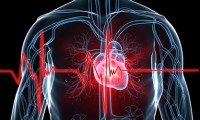-
Explanatory AI system enables more accurate diagnosis of fetal congenital heart disease
- Source: https://www.news-medical.net/news/20220405/Explanatory-AI-system-enables-more-accurate-diagnosis-of-fetal-congenital-heart-disease.aspx
- 2,006
- April 6, 2022
-
Increased Bilirubin can Reduce Cardiovascular Risk
- Source: India Times
- 852
- July 5, 2018
-
Can Marriage Save You From Heart Disease?
- Source: Medical News Today
- 873
- June 22, 2018
-
Early periods, menopause linked to heart disease
- Source: msn
- 870
- January 17, 2018
-
Marital status could affect heart patients’ risk of death
- Source: msn
- 738
- December 27, 2017
your submission has already been received.
OK
Subscribe
Please enter a valid Email address!
Submit
The most relevant industry news & insight will be sent to you every two weeks.








